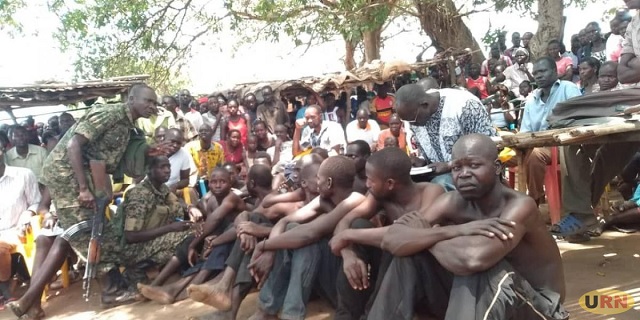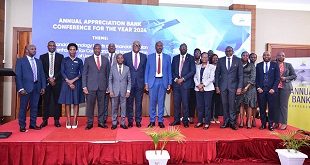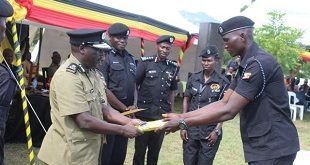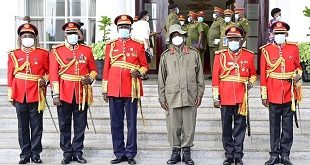
Gulu, Uganda | THE INDEPENDENT | The over two decades of war in Northern Uganda has left a big question of belonging to hundreds of children in Acholi.
They were born to local mothers and fathered by either the LRA rebel fighters or UPDF during the war. Some grew up on the streets, and have sired children but cannot find their home or where belong. They have become a source of social tension in Gulu, Lira, and districts in Acholi. Researchers from Makerere University’s College of Humanities and Social Sciences say the children or adults popularly referred to as Aguu in parts of Acholi and Owukwuk in Lango require urgent attention because they are yet another post-war crisis in Northern Uganda.
They are further calling for a national conversation to shine a torch on the popular, yet taken-for-granted question of a people that feel they don’t have a strong foundation, which lack of a strong foundation contributed to their sense of lack of belonging.
Dr. Amon Ashaba Mwiine, a Lecturer in the School of Women and Gender Studies, Makerere University was one of the speakers at the National Convention on Aguu: Floating Population and the Quest for Social Belonging in Northern Uganda. He said he and other researchers on the issue think there is a need to put a torch on the conversation that remains at the margins.
“When you talk about the conversation of people asking about who am I?, Why is everybody rejecting me?, Where do I belong?, which one is my clan?, Why Am I labeled like this?, These don’t quickly fall into the framework that the government often uses in post-conflict programming” said Ashaba Mwiine.
He said those issues fall into the human, social, and software aspects of recovery. “But unfortunately remain unattended to. We want a conversation to inspire national dialogue on how to engage with these submerged, yet very essential post-conflict situations” Ashaba Mwiine explained
The Floating Population in Northern Uganda According to Dr. Ashaba Mwiine, this is a kind of population that describes categories of people who find themselves with very precarious identities in post-conflict Northern Uganda.
“Those who were born from IDP camps, those who returned from the bush. People with no known parents because of the circumstances of the war. People with no clan identity and no ancestral land identity” Ashaba Mwiine further explained that those are people who are detached from the Acholi history and culture and operating outside the cultural frameworks that regulate behavior in the region.
“The floating population is also traced in the language in everyday life. They talk about all that. People born in the camps, people who returned, Aguu or criminal gangs that need to be clamped down. Or new elders who no longer have cultural traditions”
During the LRA war, it is estimated that between 10,000 and 15,000 people mainly women and girls were abducted from their homes to serve as fighters and sex slaves.
Some women were raped and impregnated by the fighters and gave birth to children whose fathers or clans they could not trace. It is estimated that about two thousand such young people are living in the Northern Districts of Gulu, Kitgum, Lira, Amuru, Agago and Pader among others.
“We have children with no known fathers, and because of that when they return to their maternal homes, there is reservation on whether they are welcome. Because they are worried that when they grow, they might demand for land. And so you realize that the tension that surrounded the boys was much more tense,” said Ashaba Mwiine.
Social scientists are finding that most of those have quickly discovered that they lack a belonging or a feeling or being connected to communities they should have turned to yet they note that belonging is also critically tied to social identity—a set of shared beliefs or ideals.
The latest documentation from the College of Humanities and Social Sciences (CHUSS) is not the first to raise issues about the fate of “fatherless” children related to the LRA conflict. In 2015 the Justice and Reconciliation Project produced a report titled
“Alone Like a Tree: Reintegration Challenges Facing Children Born of War and Their Mothers in Northern Uganda. It found that in most traditions in northern Uganda, identity and belonging is tied to one’s father.
“This includes key areas like access to land, inheritance, and marriage. Mothers report that no one on their mother’s side wants to stand up and support the boys who want to get married and need dowries for their brides” said the report which further noted that ‘Knowing one’s home” that is, the paternal village and clan, is a key component of identity and belonging in Acholi.
This assertion was mostly highlighted by the fathers who believed it was important for a child to know his/her “real” identity: In July 2014 Human Rights Watch released a report titled ‘Where do you want us to go?’, dealing with abuses against street children in Uganda. The report stated that: ‘Children living on the streets… throughout Uganda’s urban centres face violence and discrimination by police, local government officials, their peers, and the communities in which they work and live
Who are the Aguu in Acholi?In Gulu city, there has emerged a big social tension between communities and street children now known as Aguu. Members of that group are known for all sorts of crimes including killings.
During the last elections, politicians in the region tended to hire them to perpetrate electoral violence. While many have blamed the emergence of “Aguu criminality” on the failure of the criminal justice system, Dr. Ashaba Mwiine thinks it’s a problem of identity. “ Of who we are, of that cultural foundation that has been robbed of us because of the protracted effect of conflict”
Most of the Aguu or the floating people in Northern Uganda have according to Ashaba Mwiine been characterized by extreme anger that is animated by a sense of hopelessness, sadness, failure, humiliation, and helplessness “ We also heard that Aguu don’t fear to die. This is the kind of population that we are talking about”
Makmot (not real name) is one of the young men under rehabilitation at Comboni Samaritans of Gulu. He told URN that he, other boys and girls hate being called Aguu.
“And it is a name we also don’t understand. For us in the streets, we call ourselves survivors. Because we don’t have anyone to help us. We also want to see a bright future, we also want to have families. That is what we yearn for” he said. He revealed that what they fear most are military men who usually raid their ghettos. “Yes we fear them and they give us a lot of hard time in Gulu city. Every time we are running. Every corner they are there looking for us”
Ochen is one of the floating persons in Northern Uganda, he formerly belonged to the Aguu street gangs but he was lucky to access an education.
“Those days we were on the streets because we lacked where to stay and we lacked food to eat. But now it has shifted from lacking what to eat to ambushing someone and killing. At least to survive,” said Ochen who said his mother was raped and impregnated while in captivity by the LRA rebels.
In Gulu, there is a feeling that the government especially the security services and the politicians have been soft in handling the Aguu question while those boys and girls rob and kill community members.
Jane Francis Amongin Okili, Resident City Commissioner, reckons that the Aguu question remains complex but denies the security officers were handling it with kid gloves.
“I was posted to Gulu in 2022 but everyone was like will you manage Aguu? People came up with so many solutions. Even when I spoke to the security team, they were like we have been here and failed. We are waiting for a commander to tell us to shoot. If we shoot like six, then we can have some peace” said Okili. She said many have been arrested and jailed but when released, they come out more dangerous.
. Justice Minister, Norbert Mao said the Aguu phenomenon which is characterized by violence and disorderly conduct isn’t genetic or hereditary but a learning behavior, coping mechanism, and a response to circumstances and social environment.
“So we must look at the social environment and circumstances. Our children have been exposed to a lot of violence and that partly explains their aggressiveness. Because a major feature of being Aguu is aggressiveness,” said Mao who has previously served as Gulu District Chairperson.
“I’m not counsel for the Aguu and their crimes. A crime is a crime. The state must make sure that it is very risky to kill a Ugandan, it is very risky to snatch a lady’s handbag and it is very risky to injure anyone,” Mao stated.
Dr. Josephine Ahikire, a Professor and the former Dean of the School of Women and Gender Studies told URN that Aguu is a development issue, it’s a gender issue and it’s a national issue.
*******
URN
 The Independent Uganda: You get the Truth we Pay the Price
The Independent Uganda: You get the Truth we Pay the Price


